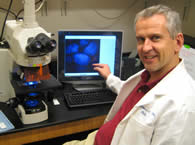News Release: Research, School of Medicine
Oct. 21, 2009
Vaccine Scientist Receives Grand Challenges Explorations Grant for Innovative Global Health Research
 Ifor Williams, MD, PhD
Ifor Williams, MD, PhDEmory University School of Medicine announced today that it has received a $100,000 Grand Challenges Explorations grant from the Bill & Melinda Gates Foundation. The grant will support an innovative global health research project conducted by Ifor Williams, MD, PhD, associate professor of pathology and laboratory medicine, titled "Potentiating Mucosal Vaccines by RANKL Induction of M cells."
Williams' project is one of 76 grants announced by the Gates Foundation in the third funding round of Grant Challenges Explorations, an initiative to help scientists around the world explore bold and largely unproven ways to improve health in developing countries. The grants were provided to scientists in 16 countries on five continents.
To receive funding, Williams showed how his idea falls outside current scientific paradigms and might lead to significant advances in global health. The initiative is highly competitive, receiving almost 3,000 proposals in this round.
Williams and his colleagues have identified a protein that could enable more vaccines to be delivered through the mucosal surfaces of the mouth or nose, where the body often first encounters bacteria and viruses.
M cells, a type of cell found in the intestines, may be a key to effective mucosal vaccines, because they act like "conveyor belts" transporting small particles across mucosal barriers. Effective oral vaccines such as polio vaccine come from pathogens that preferentially stick to M cells and exploit them to invade mucosal tissues in the intestine.
"As bacteria and food and other material comes through the intestine, M cells divert a bit of that stream," he says. "It's how the immune system keeps track of what's out there."
Working with Williams, graduate student Kathryn Knoop discovered that a protein the body makes called RANKL (receptor activator of NF-kB ligand) is essential for the proper development of M cells. In addition, mice treated with RANKL had more M cells throughout their intestines.
The Journal of Immunology recently published the team's research results.Williams says the Gates grant will allow his laboratory to test whether RANKL treatment can boost the immune response to oral vaccines in mice. Also, he plans to examine how RANKL treatment affects the mucosal surface inside the nose.
"The winners of these grants show the bold thinking we need to tackle some of the world's greatest health challenges," says Dr. Tachi Yamada, president of the Gates Foundation's Global Health Program. "I'm excited about their ideas and look forward to seeing some of these exploratory projects turn into life-saving breakthroughs."
About Grand Challenges Explorations
Grand Challenges Explorations is a five-year, $100 million initiative of the Gates Foundation to promote innovation in global health. The program uses an agile, streamlined grant process - applications are limited to two pages, and preliminary data are not required. Proposals are reviewed and selected by a committee of foundation staff and external experts, and grant decisions are made within approximately three months of the close of the funding round.
Applications for the current round of Grand Challenges Explorations are being accepted through November 2, 2009. Grant application instructions, including the list of topics for which proposals are currently being accepted, are available at http://www.grandchallenges.org/explorations.
###
The Robert W. Woodruff Health Sciences Center of Emory University is an academic health science and service center focused on missions of teaching, research, health care and public service. Its components include schools of medicine, nursing, and public health; Yerkes National Primate Research Center; the Emory Winship Cancer Institute; and Emory Healthcare, the largest, most comprehensive health system in Georgia. The Woodruff Health Sciences Center has a $2.3 billion budget, 17,000 employees, 2,300 full-time and 1,900 affiliated faculty, 4,300 students and trainees, and a $4.9 billion economic impact on metro Atlanta.
Learn more about Emory’s health sciences:
Blog: http://emoryhealthblog.com
Twitter: @emoryhealthsci
Web: http://emoryhealthsciences.org
